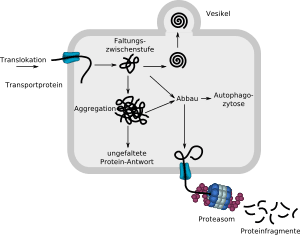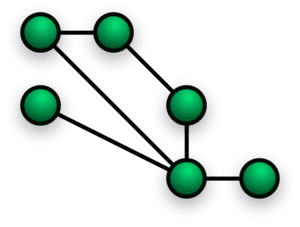
A team led by a longtime Oregon Health & Science University researcher has demonstrated in mice what could be a revolutionary new technique to cure a wide range of human diseases — from cystic fibrosis to cataracts to Alzheimer’s disease — that are caused by “misfolded” protein molecules.
Misfolded protein molecules, caused by gene mutation, are capable of maintaining their function but are misrouted within the cell and can’t work normally, thus causing disease. The OHSU team discovered a way to use small molecules that enter cells, fix the misfolded proteins and allow the proteins to move to the correct place and function normally again.
The researchers were led by P. Michael Conn, Ph.D., who was a senior scientist in reproductive sciences and neuroscience at OHSU’s Oregon National Primate Research Center and professor of physiology and pharmacology, cell biology and development and obstetrics and gynecology at OHSU for the past 19 years. This month, Conn joined Texas Tech University Health Sciences Center as senior vice president for research and associate provost.
The team’s work will be published this week in the early online edition of the Proceedings of the National Academy of Sciences. The work was the culmination of 13 years of work on the process by Conn andJo Ann Janovick, former senior research associate at the ONPRC who is now also at TTUHSC. Richard R. Behringer, Ph.D., from the University of Texas MD Anderson Cancer Center, M. David Stewart, Ph.D., from the University of Houston, and Douglas Stocco, Ph.D., andPulak Manna, Ph.D., from the department of biochemistry/microbiology at TTUHSC, also contributed to the work.
Conn and his team perfected the process in mice, curing them of a form of disease that causes males to be unable to father offspring. The identical disease occurs in humans and Conn believes the same concept can work to cure human disease as well.
“The opportunity here is going to be enormous,” said Conn, “because so many human diseases are caused by misfolded proteins. The ability of these drugs – called ‘pharmacoperones’ – to rescue misfolded proteins and return them to normalcy could someday be an underlying cure to a number of diseases. Drugs that act by regulating the trafficking of molecules within cells are a whole new way of thinking about treating disease.”
The Latest on: Pharmacoperones
- Feed has no items.
via Bing News
The Latest on: Misfolded protein moleculess
- The Secret of Long-Lived Stem Cells' Ability To Avert Aging Revealedon April 30, 2024 at 5:00 pm
On the other hand, long-lived HSCs, which do not divide often, face the problem of the accumulation of misfolded ... disordered proteins naturally change their 3-D conformation to interact with ...
- ZIP7: A novel target for treating degenerative diseases associated with misfolded proteinson April 30, 2024 at 2:37 pm
Proteins are the workhorses of life. Organisms use them as building blocks, receptors, processors, couriers and catalysts.
- Study uncovers the secret of long-lived stem cellson April 30, 2024 at 1:20 pm
Nothing lives forever, but compared to other cells in the body, hematopoietic stem cells (HSCs) are remarkably long-lived. HSCs are blood-forming cells—they give rise to rapidly dividing progenitor ...
- Uncovering the secret of long-lived stem cellson April 29, 2024 at 5:00 pm
On the other hand, long-lived HSCs, which do not divide often, face the problem of the accumulation of misfolded ... disordered proteins naturally change their 3-D conformation to interact with ...
- New method rapidly reveals how protein modifications power T cellson April 29, 2024 at 12:10 pm
Imagine riding a bike. Now imagine riding a bike with an enormous beach ball stuck on your handlebars. That "modification" might change your experience quite a bit. In our cells, molecules called ...
- Microgravity-grown crystals reveal new insights into protein structureson April 29, 2024 at 7:19 am
Biochemists have long been working around a blind spot when it comes to proteins. They know that hydrogen constitutes nearly half of the atoms in proteins, but how they contribute to protein function ...
- How Mitochondria and the Cell Nucleus Coordinate to Create Proteinson April 29, 2024 at 5:00 am
Mitochondria contain the tiny power plants that churn out life-sustaining energy molecules in our cells. In 2016, the lab of HMS geneticist Stirling Churchman showed that in yeast, cell nuclei and ...
- A shortcut for drug discovery: Novel method predicts on a large scale how small molecules interact with proteinson April 25, 2024 at 11:00 am
For most human proteins, there are no small molecules known to bind them chemically (so-called "ligands"). Ligands frequently represent important starting points for drug development but this ...
- Zombie Deer, Prion Disease & Another Dreaded Chemistry Lesson From Hellon April 23, 2024 at 7:08 am
Between COVID, HIV, Dengue, Ebola, and emerging flu variants, the last thing the world needs is another type of pathogen, let alone with no treatment or cure. But, although rare, prion diseases, such ...
- Starving cells hijack protein transport stationson April 20, 2024 at 11:28 am
Study details how nutrient-starved cells divert protein transport stations to cellular recycling centers to be broken down, highlighting a novel approach cells use to deal with stressful conditions.
via Bing News









